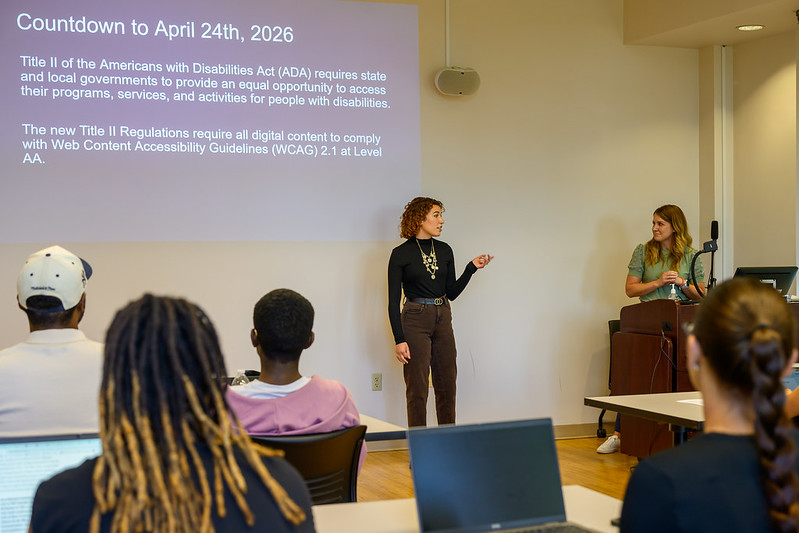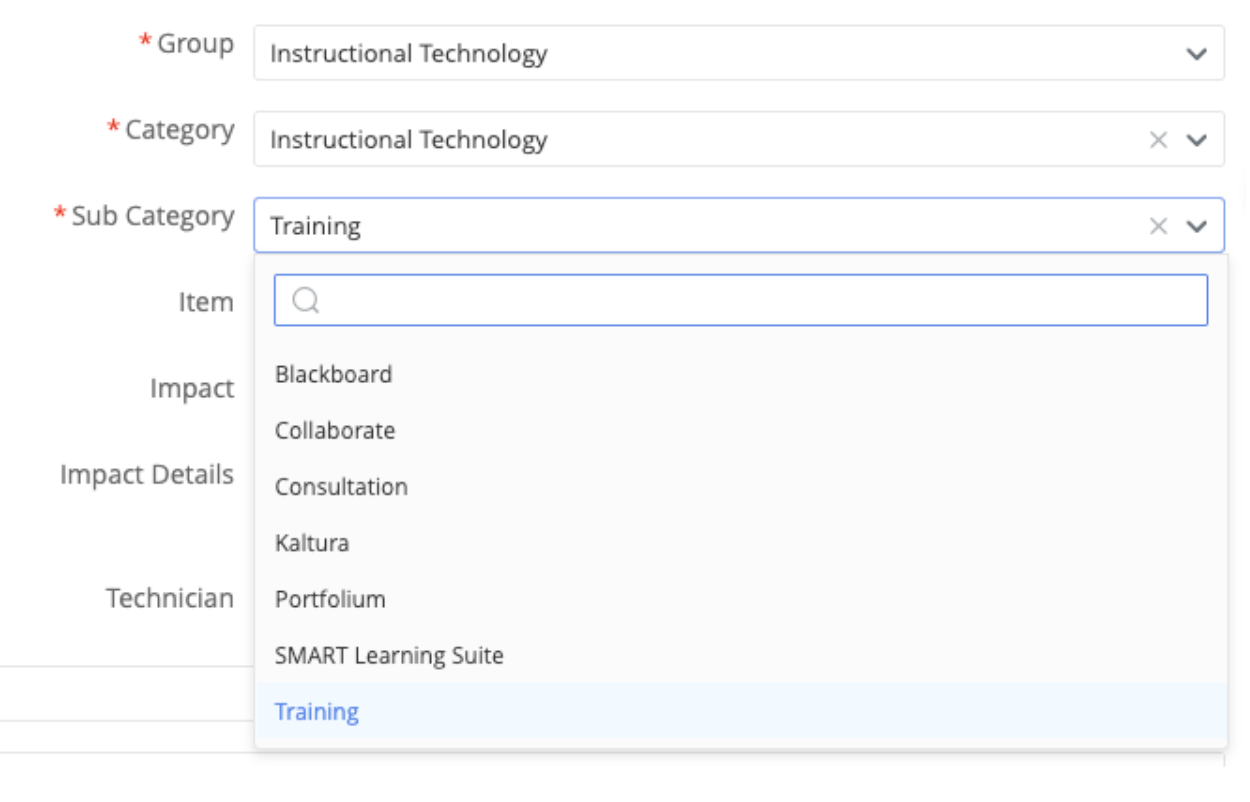Our Shared Commitment to Accessibility
Meeting the Title II April 2026 deadline is a natural extension of SMCM’s commitment to facilitating an inclusive and rigorous learning environment for all students. SMCM views this initiative as a collaborative effort where we succeed together. Every step toward greater digital accessibility matters–whether it's adding alt text to an image, captioning a video, or redesigning a complex form— We're here to support you throughout this process, celebrating progress and creative problem-solving, while ensuring our institutions meet federal accessibility requirements.
Digital Accessibility at SMCM
St. Mary’s College of Maryland is committed to providing equal access to information, services, and technology for all members of our community, including students, faculty, staff, and visitors. In alignment with our values, and in compliance with the Americans with Disabilities Act (ADA), Section 504, and Section 508, we are actively working to ensure that our digital resources are accessible to everyone.

How to get started?
- Faculty, start with your Spring 2026 courses, use Blackboard Ultra for the most tools to help with accessible content. Attend CITL Trainings
- Start with your most popular pieces, like the syllabus.
- Work on low-hanging fruit. Text heavy documents are a good start.
- Use an accessible branded template for any new digital content you create
- Follow the top 6 tips for creating accessible instructional content
- Start with headings and document structure
- Avoid tables unless absolutely necessary
- Make sure all your images have good alt text
- Make sure all your videos are transcribed
- Make sure you use colors that meet contrast requirements. This resource shows how you can use SMCM Brand colors in compliance with contrast requirements.

Training and Support
We provide training and resources to support accessible practices, including:
-
- Accessibility workshops for faculty and staff - Keep your eye on SMCM Daily email for announcements of workshops each month from CITL.
- Guides for creating accessible documents, videos, and websites
- For webpages, use the WAVE Chrome Extension to access the accessibility of the webpage you are working on
- Training archives are available for Staff and Faculty in the Google Classroom Students can join the Student Google Classroom by entering code rpeos3av
- Blackboard Ultra Training and Support - Submit a Ticket for Instructional Technology
- One-on-one support and office hours - Reach out to your unit’s point of contact for assistance.
- Student Affairs - Kelly O'Grady
- Institutional Advancement - Jeannette Modic
- Academic Affairs - Katy Arnett
- Business & Finance - Jennifer Falkowski
- Enrollment - TBD

Roles and Responsibilities
Everyone in the SMCM community has a role in the creation of accessible digital content. See below to learn more about expectations for how you can support the institution’s efforts to comply with the updated ADA Title II guidelines.
Institutional Leadership
Ensures accessibility is a strategic priority.
College President, Provost, Vice Presidents, Dept. Chairs, Unit Directors, etc. play a critical role in prioritizing and supporting digital accessibility efforts across campus. Those in leadership roles must ensure their staff prioritize the accessibility of SMCM's digital resources as this is necessary for all members of the SMCM community, including those with disabilities, to actively engage with the college's programs, services, and activities.
Responsibilities include
- Upholding a commitment to inclusive, accessible materials
- Promoting a culture of accessibility and inclusivity.
- Coordinating resources to support implementation.
- Collaborating with the Digital Accessibility Task Force to improve digital access across campus.
Digital Accessibility Task Force
This group meets regularly to share resources and work on strategies for getting the college’s digital content to meet the WCAG 2.1 AA guidelines by the April 24, 2026 deadline. You can reach out to any of them for more information.
- Dr. Jerri Howland, Vice President of Student Affairs, Point of Contact for President’s Cabinet
- Jeannette Modic, Director of Web Services, Point of Contact for Institutional Advancement
- Kelly O'Grady, Director of Accessibility Services, Point of Contact for Student Affairs
- Amy Baker Coordinator of Accessibility Services
- Samantha Elliott, Director of the Center for Inclusive Teaching & Learning
- Amanda VerMeulen, Director of the Hilda C. Landers Library and Archives
- E. Jenell Sargent, Associate Vice President of Information Technology and Chief Information Officer (CIO), Chief Information Security Officer (CISO)
- Jennifer Falkowski, Director of Instructional Systems and Support, Point of Contact for Business and Finance
- Katy Arnett, Associate Provost, Point of Contact for Academic Affairs
Faculty
Teaching faculty must ensure all students are provided with access to the instructional resources in their courses. This includes, but is not limited to, your course videos, syllabi, publisher resources (e.g., Wiley, McGraw Hill, Hawkes, etc.), textbooks, discussion board, course site, etc.
Responsibilities include
- Upholding a commitment to inclusive, accessible materials.
- Ensuring Word, PPT, and PDF course documents are available in accessible formats.
- Whenever possible, using course textbooks that are available in both digital and printed formats.
- When applicable, ensuring publisher resources comply with WCAG 2.1 AA standards.
- Hosting course videos in Kaltura (i.e., Bb/Canvas); ensuring they are accurately captioned and transcribed; and, when necessary, audio described to support students who are blind/low vision.
- Using accessible communication platforms like Zoom or MS Teams when facilitating synchronous online meeting sessions (for courses and/or specific class sessions)
Web Developers & Web Content Authors
Web developers and web content authors develop and maintain the templates that many of our websites are built on. As such, they lay the groundwork for units/departments to create accessible public-facing web resources that can be accessed by all members of the SMCM community, including those with disabilities.
Responsibilities include
- Upholding a commitment to inclusive, accessible materials
- Ensuring WordPress and Drupal web templates adhere to WCAG 2.1 AA standards.
- Working toward achieving at least 95% accessibility compliance score for any websites that you oversee.
- Participating in regular web accessibility trainings/meetings.
Administrative Faculty & Staff
Professional faculty and staff oversee critical college operations like the registrar, IT support services, parking and transportation, student health, counseling and psychological services, recreation, etc. To ensure equivalent access to these support services, it is important these units know how to comply with WCAG 2.1 AA standards.
Responsibilities include
- Upholding a commitment to inclusive, accessible materials
- Ensuring online resources (e.g., forms, applications) are accessible to individuals with disabilities accessing critical unit/departmental supports and services (e.g., Anthology, Student Health, Registrar, Parking Services, etc.).
- Ensuring electronic documents (i.e., Word, PPT, PDF) adhere to WCAG 2.1 AA standards.
- Ensuring digital communications (i.e., social media, newsletters, listservs, etc.) adhere to WCAG 2.1 AA standards.
- Participating in trainings to stay abreast of the latest digital accessibility-related changes/updates. Including our self-paced course on digital accessibility
- Ensuring purchasing and procurement guidelines
Library & Archives
The Library & Archives provide access to an extensive collection of digital information and research support resources to the SMCM community.
Responsibilities include
- Upholding a commitment to inclusive, accessible materials
- Ensuring the Library website, research guides, FAQs, and scheduling solutions, and online-resource providers are accessible to faculty, staff, students, and visitors with disabilities.
- Providing access to an OCR capable scanner for faculty, staff, and student use.
- Collaborating with teaching faculty and the Office of Accessibility Services to purchase items for the collection in accessible formats.
- Increasing access to records in the College Archives by creating Title II-compliant digital copies of physical documents and photographs.
Purchasing & Procurement
The Purchasing Office oversees the procurement of goods and services by collaborating with units and communicating with vendors to ensure all Commonwealth and Mason policies are followed. From a digital accessibility standpoint, procurement officers ensure that technology purchases include guidance for vendors to provide tools that meet WCAG 2.1 AA standards.
Responsibilities include
- Upholding a commitment to inclusive, accessible materials.
- Ensuring RFPs, contracts, and purchasing agreements include accessibility language referencing WCAG 2.1 AA standards and any relevant state and local digital accessibility-related laws.
- Collaborating with faculty, staff, and/or units to ensure technology vendors provide voluntary product accessibility templates (VPATs) and/or accessibility conformance reports (ACRs) as a part of any RFPs, contracts, and purchasing agreements.
- Collaborating with the OIT to ensure all technology purchases are reviewed for, among other things, accessibility.
Students
Students play a crucial part in raising awareness when they encounter digital accessibility-related issues when accessing websites, documents, videos, platforms (e.g., Anthology), supplemental apps used in class, etc.
Responsibilities include
- Upholding a commitment to inclusive, accessible materials.
- Report accessibility-related issues (e.g., image-based PDFs, videos with inaccurate captions or no captions at all, etc.) on SMCM websites or instructional materials.
- Consider working with the Office of Accessibility Services by forming a student group helping to test the accessibility of SMCM’s digital resources.
- Creating digitally accessible coursework that is open to the class, such as presentations and discussion posts
- Ensuring SMCM affiliated social media accounts (including club accounts) are posting digitally accessibility content.
Feedback and Reporting
We welcome feedback on digital accessibility. If you encounter an accessibility barrier on our digital platforms, please contact us.
We are committed to timely responses and providing accessible alternatives as needed.
This plan was last updated on Sept. 23, 2025 and will be reviewed annually. Progress will be tracked through accessibility audits and public updates on key milestones.

